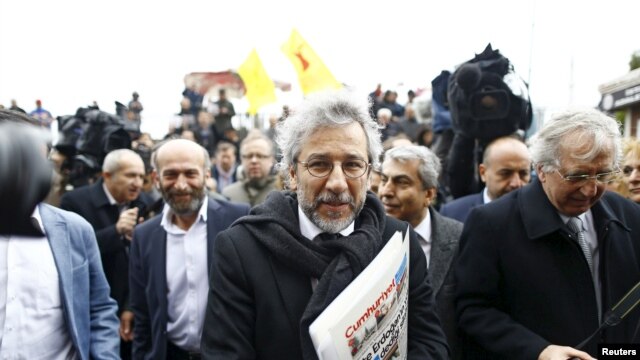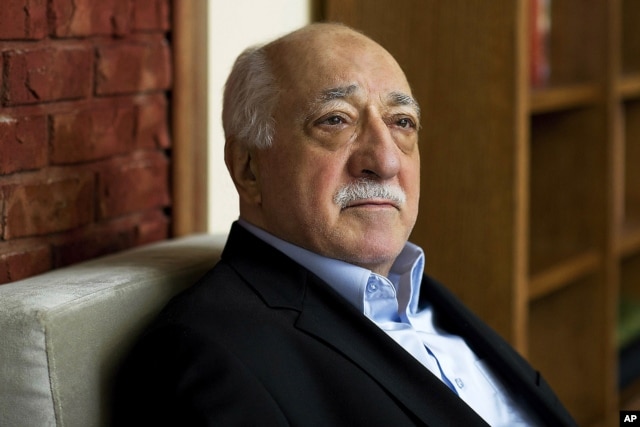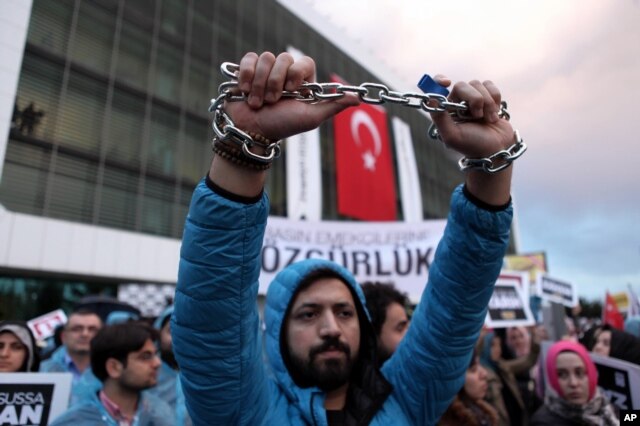Trial Adjourned for Turkish Journalists Targeted by Erdogan
News / Middle East
Trial Adjourned for Turkish Journalists Targeted by Erdogan
Cumhuriyet editor-in-chief Can Dundar, center, arrives at the Justice Palace in Istanbul, Turkey, March 25, 2016.
Last updated on: March 25, 2016 4:11 PM
ISTANBUL—
A Turkish judge on Friday adjourned until April 1 the trial of two journalists facing charges of espionage and aiding a terrorist organization with their reports on alleged government arms smuggling to Syria.
Cumhuriyet newspaper editor-in-chief Can Dundar and his Ankara bureau chief, Erdem Gul, face 30 years behind bars if found guilty. Their case has generated international interest as a test of press freedom and has provoked alarm among Turkey’s Western allies and human rights groups.
Dundar and Gul were arrested in November after President Recep Tayyip Erdogan filed a personal complaint against them. The journalists were held in pretrial detention for three months. After Turkey's Constitutional Court ruled in February that their rights had been violated, they were released.
In a controversial move, however, the lower criminal court that convened Friday in Istanbul continued with the case, and the judge ordered the trial to be held behind closed doors in response to a request by the prosecutor, who cited security concerns related to the case.
The courthouse was packed with supporters of the two journalists as well as members of human rights groups and senior Western diplomats. When opposition lawyers and politicians refused to leave the court, the judge adjourned the trial.
The journalists are accused of revealing state secrets by publishing images, dating to January 2014, of trucks bound for Syria. The newspaper said these proved Turkey was smuggling arms into Syria.
Since then, Erdogan has acknowledged that the trucks — which were stopped by Turkish gendarmes and police officers en route to the Syrian border — belonged to the intelligence agency. Erdogan said they were carrying aid to Turkmens in Syria, fighting both Syrian President Bashar al-Assad and the Islamic State group.
FILE - In this March 15, 2014, file photo, Turkish Islamic preacher Fethullah Gulen is pictured at his residence in Saylorsburg, Pa. Gulen is charged in Turkey with plotting to overthrow the government in a case his supporters call politically motivated.
Turkey also has alleged that the reporters aided an Islamic movement headed by U.S.-based cleric Fethullah Gulen, an opponent of Erdogan.
Embarrassment to president
Kadri Gursel of the Al Monitor website said the reports by Dundar and Gul embarrassed the president and his government, especially the release of police video showing the interception of the alleged arms shipment.
"The news story is a story which reveals the hidden face or illegitimate face of Turkey’s Syria policy," Gursel said. "We know that Erdogan has made this case a personal vendetta for him and wants them to be put in jail."
As he entered the courthouse Friday, Dundar told reporters that in prosecuting the case, the government was trying to create a mechanism of self-censorship. But he said he and his colleague had done nothing wrong in reporting the facts.
“We defended [the journalism], and we got arrested, you know,” Dundar said.
Emma Sinclair Webb, a senior Turkey researcher for U.S.-based Human Rights Watch, called the case "one of the most flawed prosecutions we’ve seen in recent years. It shows that the judiciary is on its knees. There is no such thing as a fair trial. There is no such thing as a fair process. And the decision to hold the whole trial in secret — it means the public will not be allowed to scrutinize the judicial process and what happens in the court and how the evidence is discussed. The press won't be able to write about it."
Thousands of people gather in solidarity outside Zaman newspaper in Istanbul, after a local court ordered that Turkey's largest-circulation, opposition newspaper be placed under the management of trustees, March 4, 2016.
Turkey has a poor human rights record and a history of pressing charges linked to the content of journalists' reports. In the last few months, several newspapers and television stations critical of the government have been seized by courts, while journalists are facing growing prosecutions under legislation that forbids insulting the president.




Comments